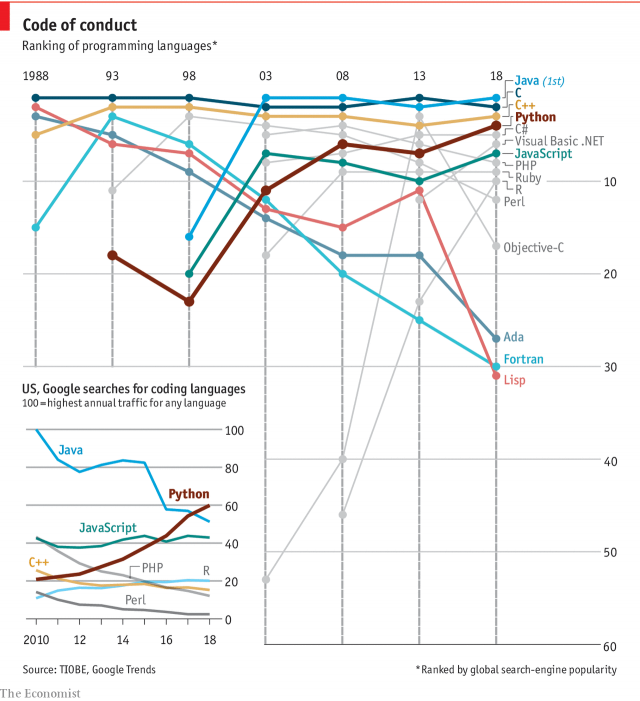Python is becoming the most popular programming language in the world.
- Transfer
Even in the summer, The Economist published an article that Python is increasingly conquering the market. But she was only now. Probably, this is due to the fact that it is very ambiguous. Indeed, despite this title, the author claims that Python, theoretically, can repeat the fate of Fortran or Lisp. Well, let's discuss. Below is a translation of this small note.

The two main advantages of a language are its simplicity and universality. Simple syntax makes it easy to learn, read and share. The versatility is easy to demonstrate with an example: the CIA used it for hacking, Google for web crawling, Pixar for film production and Spotify for recommending songs.
With such a fast-growing user base and a wide range of capabilities, Python can seem like the language that has the chance to kill all competitors. This is unlikely, according to Grady Butch, chief software specialist at IBM, who compares programming languages with empires: although at times growing power may be close to world domination, its rivals usually survive in the technical and cultural niches in which they originated. Python will not replace C and C ++, which are "lower level languages". They give the user more control over what is happening in the computer's processor. It also does not kill Java, which is popular for building complex applications, or JavaScript, which supports most web pages.
In addition, pythonists who are confident of the complete superiority of their language should follow the market. Fortran, Lisp, and Ada were very popular in the 1980s and 1990s, according to the TIOBE index, which tracks language usage among professional developers. Their shares have declined sharply, since more efficient coding options have become available. No empire, regardless of its power, can exist forever.

I was EXACTLY not going to create a language intended for mass consumptionSo said Guido van Rossum, a Dutch scientist who developed the Python programming language in 1989. But three decades later, his invention overtook almost all of its competitors and made it possible, without barriers, to code, without exaggeration, everything. Over the past 12 months, in the US, “Python” was Google more often than “Kim Kardashian” (in Russia, “Python” overtook “Timati” by the same principle. - Ed.). The number of requests has tripled since 2010, while the number of requests for other major programming languages has not changed or decreased.
The two main advantages of a language are its simplicity and universality. Simple syntax makes it easy to learn, read and share. The versatility is easy to demonstrate with an example: the CIA used it for hacking, Google for web crawling, Pixar for film production and Spotify for recommending songs.
With such a fast-growing user base and a wide range of capabilities, Python can seem like the language that has the chance to kill all competitors. This is unlikely, according to Grady Butch, chief software specialist at IBM, who compares programming languages with empires: although at times growing power may be close to world domination, its rivals usually survive in the technical and cultural niches in which they originated. Python will not replace C and C ++, which are "lower level languages". They give the user more control over what is happening in the computer's processor. It also does not kill Java, which is popular for building complex applications, or JavaScript, which supports most web pages.
In addition, pythonists who are confident of the complete superiority of their language should follow the market. Fortran, Lisp, and Ada were very popular in the 1980s and 1990s, according to the TIOBE index, which tracks language usage among professional developers. Their shares have declined sharply, since more efficient coding options have become available. No empire, regardless of its power, can exist forever.
Only registered users can participate in the survey. Sign in , please.
Will Python repeat Fortran, LISP and Ada?
- 19.6% Most likely yes 125
- 63.7% Probably, but the python will still be in the top 406 for a long time
- 16.6% No, never 106
